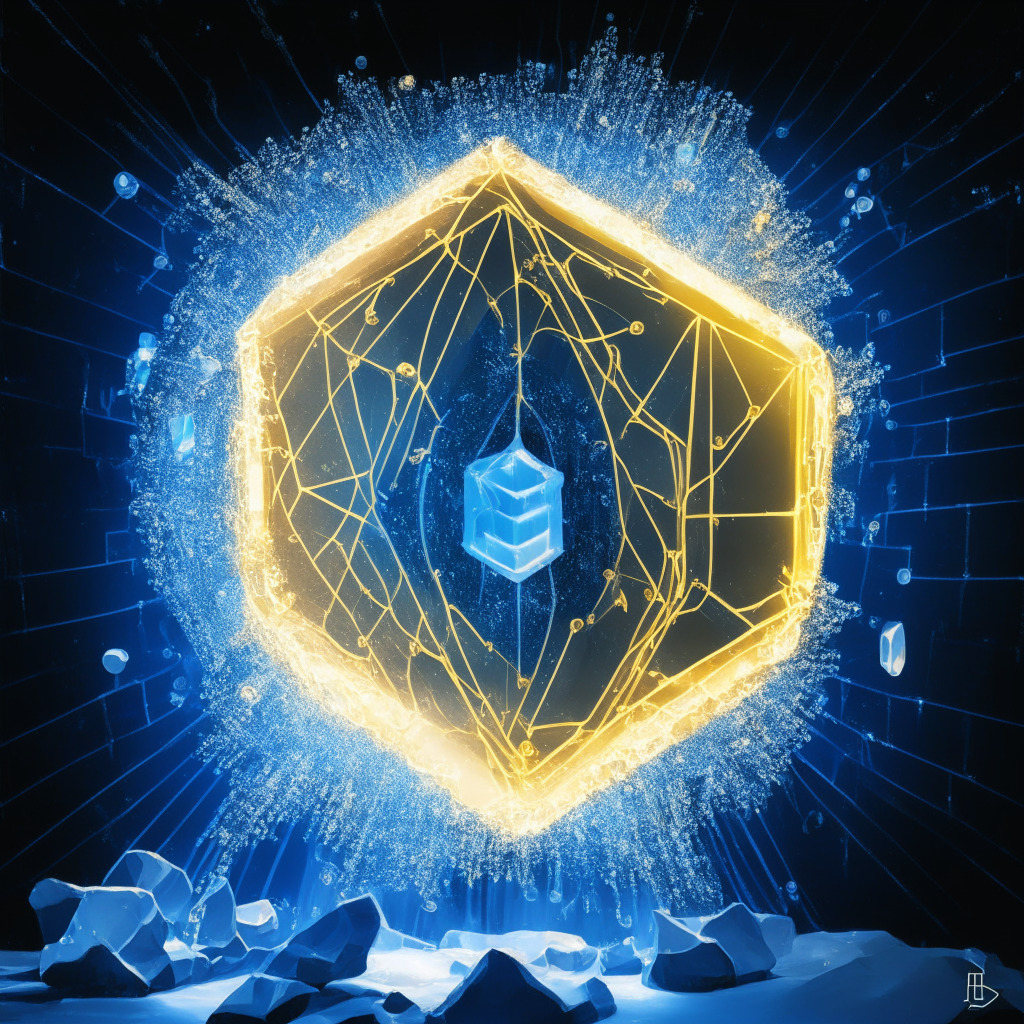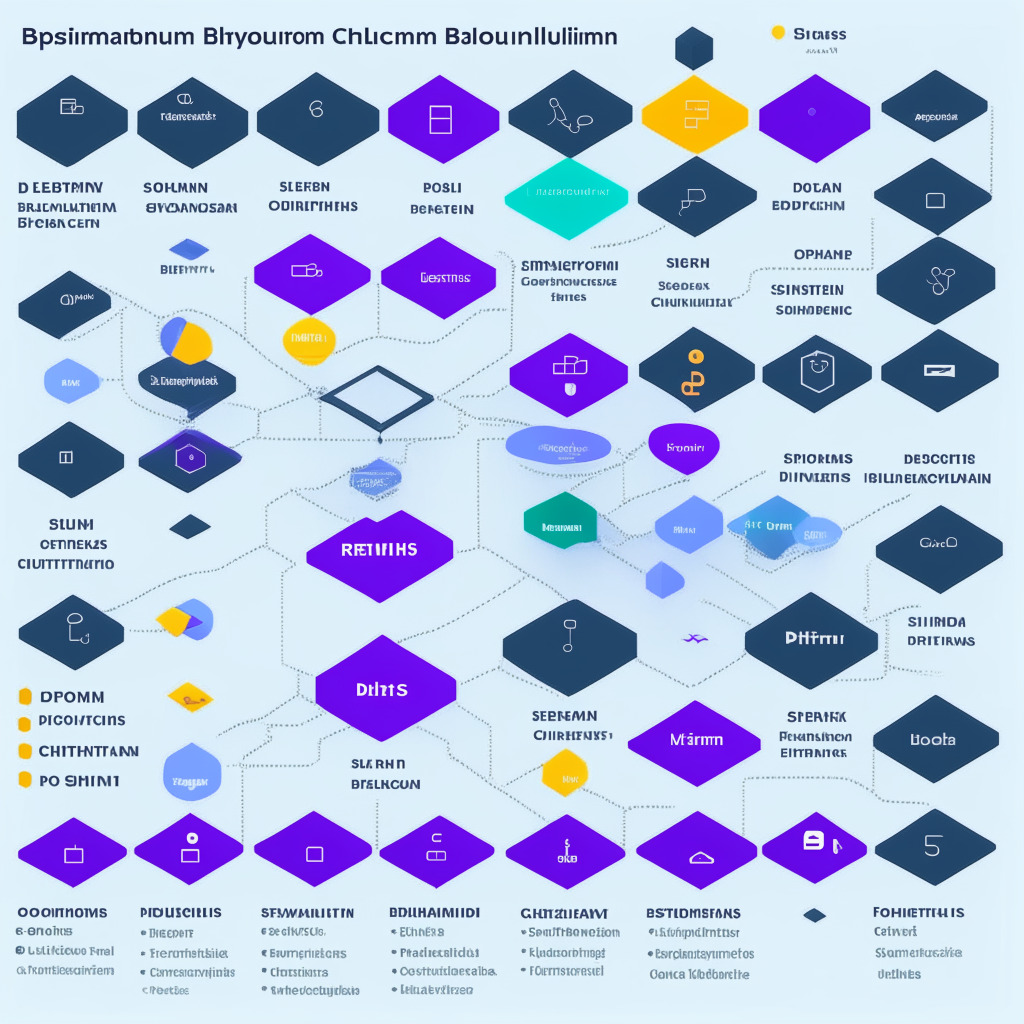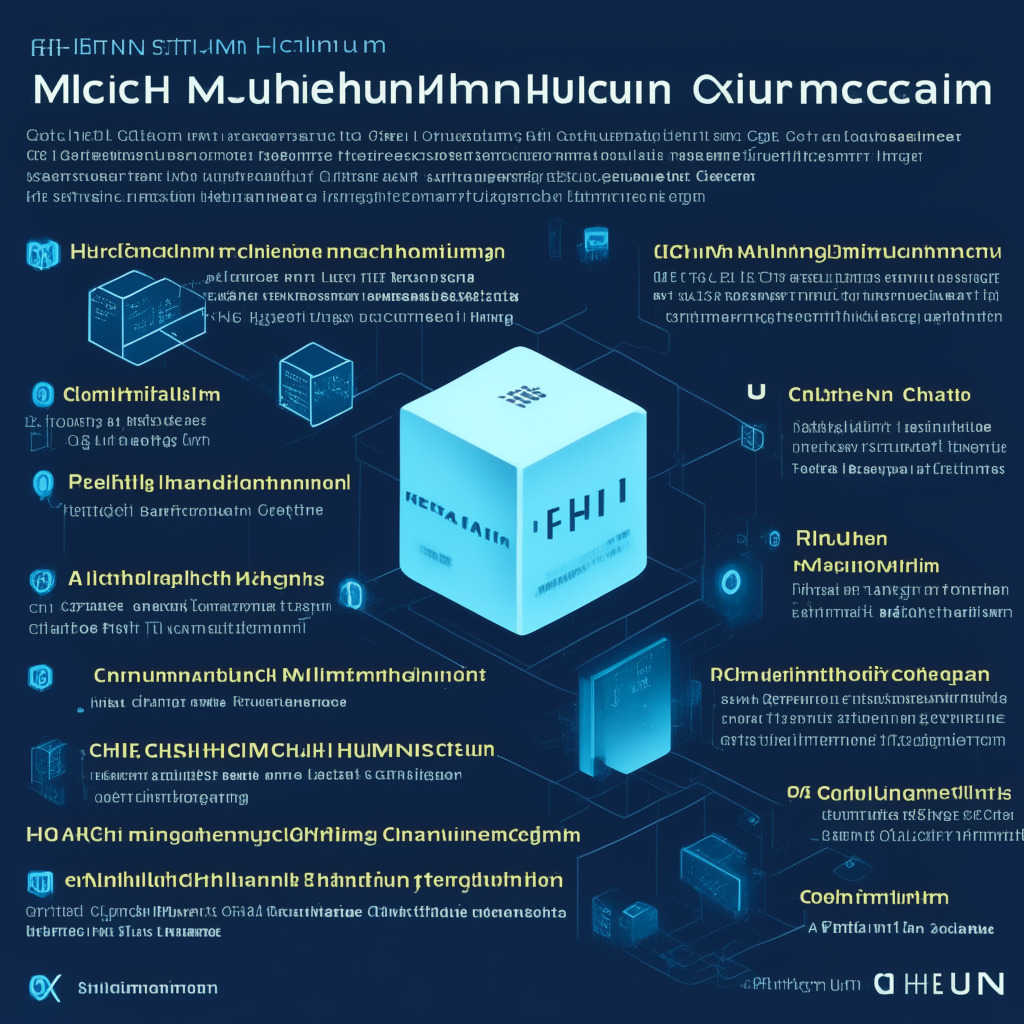Memecoin PEPE has seen an 80% decline in value because of rumors of a potential “rug-pull” by its developers. After changing token transfer rules, they moved $16 million worth of PEPE to exchanges, leading some to predict a crash. However, increased buying and oversold indicators point towards a possible market rebound.
Search Results for: Multichain
Weathering the Storm: How Exodus Survives and Thrives Amid Crypto Ebb and Flow
“Despite a bearish market, multichain wallet Exodus reported Q2 2023 revenue of $12.4 million, a modest 4% dip year-over-year. Notable was a strong fiat onboarding revenue increase, up 220% from 2022. High trade volumes came from Bitcoin, Tether and Ether. Strikingly, Exodus alleviated some financial stresses by drastically cutting administrative and marketing budgets by 65%, resulting in administrative expenses shrinking to 32.2% of revenue.”
Forta Network Amplifies Scam Detection: A Leap Forward or a Perpetual Tightrope Walk?
“Forta Network has enhanced its scam detection services by expanding its threat focus and incorporating malicious URL data. The service employs real-time threat detection across seven Ethereum Virtual Machine chains, and uses predictive techniques and new smart contract scanners to identify potential crypto threats.”
Cybersecurity Challenges in Crypto: The Cypher Protocol Breach and its Implications on Other Players
“Cypher Protocol, a Solana-based decentralized exchange, paused operations due to a security breach, with estimated losses of $1 million. Details remain scarce but blockchain explorers suggest funds have begun moving, possibly indicating liquidation attempts. This increases the recent losses suffered by the crypto-community, emphasizing the need for improved security measures in the growing blockchain space.”
The Crushing Uncertainty: Crypto’s Struggle with Regulators and the Future of Digital Assets
“A significant episode in China underlined the persistent uncertainty around cryptocurrency’s legal status. A man lending Bitcoin faced an unsympathetic legal system when the borrower defaulted. The court ruled Bitcoin, as a digital commodity, doesn’t hold the same legal status as fiat currencies, therefore, can’t be subject to legal enforcement or compensation.”
Taming the Wild West of Crypto: Unraveling the Ethereum Wallet Offloading Millions
An Ethereum wallet linked to illicit activities reportedly sold $4 million worth of altcoins on Uniswap, causing a significant dip in the price of WOO token. The wallet was suspiciously funded by Multichain’s address despite no known connections. This incident highlights the ongoing battles against illegal activities within the blockchain space and the importance of maintaining digital transaction integrity.
Navigating the Labyrinth of Crypto Security: Curve Finance Exploit and the Quest for Resilience
“Recent headlines reveal the risks in daily crypto transactions, as seen in the Curve Finance and Multichain protocol exploits. The security breaches exposed the need for reform and evolution in blockchain safety measures. Consequently, systems like the Global Systematically Important Protocol (G-SIP) could improve cybersecurity and resilience, signifying promise and caution in the cryptosphere.”
Cryptocurrency’s Dark July: Rising Hacks, Falling Recoveries and the Fight for Security
July 2023 saw a historic $486 million loss in the cryptocurrency markets, largely due to the multichain exploit. Recovery efforts have been significantly inadequate, recovering only a mere $6.15 million. Ethereum incurred the bulk of these losses, with worrying trends showing increasing vulnerability of the cryptocurrency sector to hacks and thefts.
The Unraveling of Hector Network: Decentralization Predicament and the Illusion of Quick Exits
The formerly $100 million treasury of stablecoin project, Hector Network, has collapsed to $16m following the Multichain bridge’s demise. The DAO’s liquidation process is causing community frustration given its complexity and projected 6 to 12-month timeframe. Hector’s endeavors beyond stablecoin, including a token launchpad and NFT marketplace, might have diluted its focus and deepened the treasury situation.
Cosmos: Shaping the Future of Blockchain or Becoming Obsolete in the Process?
“Despite a promising start, recent times have not been favorable for Cosmos. Developers veered away after the catastrophic crash of Terra, and substantial liquidity drop deterred integration of apps into the Cosmos ecosystem. Severe community management issues and the emergent competition from blockchain-in-a-box projects have triggered uncertainties about Cosmos’s future and identity.”
Alphapo Crypto Breach: Unraveling a $60 Million Heist and Its Ripple Effects on the Industry
“The recent Alphapo payment breach has seen estimated damages rise to over $60 million. Initial losses, previously estimated at $31 million, were hugely underestimated. The breach involved at least $21 million drained from Alphapo’s hot wallets. An additional $37 million was stolen from addresses on the Bitcoin and Tron networks.”
Blockchain Cross-Pollination: Exchange.art Bridges Ethereum and Solana for Digital Artists
“Exchange.art, a Solana-based digital art platform, announced its plans to incorporate Ethereum support, venturing into multichain operations. The aim is to attract new creators, simplify cross-ecosystem selling for artists, and foster a hub for digital and traditional art solutions.”
Cross-Chain Token Standard: A New Frontier in Cryptocurrency Security or a Potential Pitfall?
“Connext and Alchemix have launched a new cross-chain token standard ‘xERC-20’ designed to enhance security and limit bridge exploit losses. This standard allows token issuers to maintain a record of bridges and control the number of tokens each bridge can mint, aiming to protect end-users from suffering losses. However, it doesn’t escape criticisms related to bridge security and the differentiation of ‘official’ and ‘unofficial’ tokens.”
Exploring the Booming Use of ZK-Rollups and the Ongoing Shifts in the Crypto Domain
The increasing implementation of ‘Zero-knowledge rollups’ or ZK-rollups has remarkably grown in the Ethereum ecosystem. However, the DeFi domain needs better security optimization, with variegated results from bug bounty programs. Major breaches have been reported on the Multichain protocol despite bug detection strategies.
Unraveling the Intricacies of Polygon’s Token Strategy: Maturing from MATIC to POL
Polygon, an Ethereum scaling solution, plans to change its native token from MATIC to POL. Touted as a “3rd generation token”, POL optimizes user experience across the protocol’s layer 2 ecosystem and enables holders to earn rewards as validators across multiple chains. This change prompts validators to embrace multi-chain roles, yielding varying rewards and potentially significant benefits.
Bridging the Blockchain Gap: Axelar’s Ambitious Project with Microsoft’s Azure Cloud Structure
“Axelar is working on constructing a blockchain-anchored tool to bridge the gap between businesses, consumers, and decentralized applications using Microsoft’s Azure cloud structure. This potentially allows easier interoperability across different blockchain landscapes and automation of multichain deployments for Web3 products.”
Ethereum’s New Improvement Proposal: A Solution for Secure Token Bridging or Added Complexity?
Ethereum Improvement Proposal (EIP-7281), co-authored by Arjun Bhuptani, aims to standardize bridging of tokens between networks. This new protocol seeks to minimize risks like the recent Multichain incident by moving token ownership from bridges to issuers, thus limiting possible losses from bridge security breaches.
Navigating Crypto-Waters: Blockchain Prospects Amid Rising Security Concerns
“Cybercriminals exploited a recent multichain attack to initiate a fake Twitter scheme linked to the distribution of Fantom’s FTM tokens. While the blockchain holds transformative potential, these incidents underline the need for cautious handling of links and emphasize the importance of cybersecurity in the digital asset realm.”
Marathon Digital’s Mining Decline Vs the Foul Play in Crypto Markets: A Tale of Ups and Downs
“Marathon Digital’s Bitcoin mining yield declined due to adverse weather and lower transaction fees, despite a 599% increase from June 2022. However, Bitcoin miners reportedly earned $184 million in Q2 2023. Yet, hacking risks and operational challenges linked to climate change remind us of the industry’s instability, insisting on continued vigilance and resilience.”
DeFi Circuit Breakers: Innovating Security or Adding Complexity to Blockchain Markets?
In response to the surge in DeFi exploitations, a developer proposes a new Ethereum request for comment (ERC) introducing a “DeFi circuit breaker” concept. This proposed measure aims to limit large, suspicious outflows from DeFi protocols, potentially decreasing losses from hacks by 70%. However, the effectiveness of this potential security layer and its implications remain unclear.
Dissecting the Fantom Heist & Thug Life Token Surge: A Paradoxical Crypto Landscape Explained
The recent hack on Fantom’s Multichain bridge resulted in a $126 million loss, causing software confidence to plummet. In contrast, Thug Life Token’s high level of decentralization provides investor assurance. Yet, despite promising advancements, blockchain technology remains vulnerable to exploitation, highlighting the need for secure, foolproof frameworks.
Navigating LayerZero’s Bright Future Amidst Blockchain Tech Challenges
“Bryan Pellegrino, CEO of LayerZero, expresses optimism about the future of blockchain technology, with LayerZero’s usage surging dramatically. Despite facing a shifting industry landscape and technological limitations, he anticipates further opportunities and innovations, including expansion into the Asia-Pacific region.”
Teleporting Assets: Storage Proofs Revolutionize Cross-Chain Transfers and Security
Storage proofs, a cryptographic method aiming to revolutionize cross-chain asset transfers, may provide a more secure alternative to vulnerable bridges in the growing blockchain ecosystem. Starknet plans to be the first network to natively integrate storage proofs, potentially eliminating intermediary third-party “oracles,” offering enhanced security and user experience for asset transfers.
Regulatory Actions Pushing Crypto Towards Bitcoin-Centric Future: Boon or Bane?
Regulators such as the SEC could lead to a Bitcoin-focused crypto industry, potentially pushing BTC’s price over $250,000, according to MicroStrategy co-founder Michael Saylor. However, some argue for a multichain future and warn of considerable danger for BTC in the upcoming years.
Terra Luna Classic v2.1.1 Upgrade: Validator Commissions, Parity with Cosmos Chains, and Impact on LUNC Market
The Terra Luna Classic v2.1.1 upgrade brings significant changes, including a 5% minimum validator commission and the introduction of Interchain Accounts (ICA). Scheduled for June 14th, the upgrade aims to boost community engagement and bring decentralized apps to the Terra Classic chain, with a current 15% price increase in anticipation.
Terra Classic’s Parity Upgrade: A United Community, But Can It Overcome Binance’s Actions?
The Terra Classic community recently supported the v2.1.0 Parity upgrade proposal by Joint L1 Task Force, scheduled for June 14. The upgrade aims to achieve parity with other blockchains and enable building on the Terra Classic chain, making it one of the most substantial upgrades since the community took control.
SWIFT and Chainlink Collaboration: Tokenizing Assets for a Unified Blockchain Future
SWIFT collaborates with major banks and Chainlink to trial connecting private and public permissionless blockchains using Chainlink’s Cross-Chain Interoperability Protocol (CCIP). This aims to enable tokenized asset transfers across public and private networks, potentially increasing the blockchain industry size significantly.
Terra Classic v2.1.0 Upgrade: The Future of Blockchain, IBA, and Market Recovery
The Terra Classic core developer group L1TF announces the v2.1.0 upgrade proposal for June 14, aiming to bring Terra Classic on par with other blockchains. The upgrade includes features such as Interchain Accounts (IBA), minimum 5% commission for validators, security updates, and multi-chain capabilities. The community hopes for a recovery after the upgrade.
Simplifying Layer-2s: Connext’s Chain Abstraction vs Other Bridge Solutions
Interoperability protocol Connext introduces chain abstraction to enhance layer-2 experience, simplifying transactions across multiple decentralized applications on different chains. This trustless, fast technology plugs into native bridges to provide a seamless experience, countering fragmentation caused by the continuous launch of layer-2s and layer-3s.
Unraveling Gate.io Insolvency Rumors: Analysing Connections and Implications for Crypto Safety
Cryptocurrency exchange Gate.io faces insolvency rumors linked to the troubled bridging platform Multichain. Despite these rumors, Gate.io maintains smooth operations and secure, efficient digital asset trading services. The situation highlights the importance of vigilance and informed choices in the crypto space.
Avalanche’s Rapid Growth: AvaCloud’s Impact and One Million Active Users Explained
Avalanche’s AvaCloud Platform, a no-code system enabling easy design and debut of custom blockchains, has contributed to the platform reaching 1 million Monthly Active Users. The milestone demonstrates Avalanche’s increasing adoption across various sectors and strengthens its capacity for handling extensive transaction volume and interactions.
Gate.io Liquidity Concerns: Unraveling the Truth Behind Rumors and Community Speculation
Cryptocurrency exchange Gate.io faced a $150 million net outflow due to community rumors and police investigations, causing concerns about liquidity and solvency. However, Gate.io issued a statement denying these issues and assured smooth operations, focusing on establishing affiliate trading platform Gate.HK in Hong Kong.































